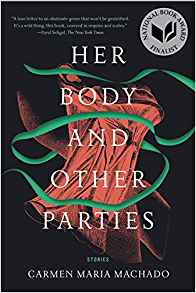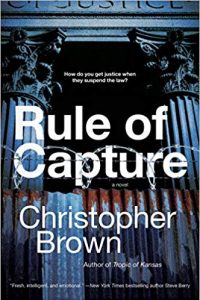Gary K. Wolfe Reviews Her Body and Other Parties by Carmen Maria Machado
 Her Body and Other Parties, Carmen Maria Machado (Graywolf 978-1-55597-788-7, $16.00, 250pp, tp) October 2017.
Her Body and Other Parties, Carmen Maria Machado (Graywolf 978-1-55597-788-7, $16.00, 250pp, tp) October 2017.
Award nominations are no way to judge anything, but it would be nice to think that the recognition afforded Carmen Maria Machado’s first collection Her Body and Other Parties might represent, if not a complete blurring of the lines between “literary” and genre fiction, at least a diminishing level of mutual intolerance. Not only was it a finalist for the National Book Award last year, but one of its stories, “The Husband Stitch”, was a finalist for both the Nebula and Shirley Jackson awards, and the eight stories originally appeared in venues as diverse as Strange Horizons and Granta. Coming only a year after Get in Trouble by Kelly Link (an author with whom Machado shares some DNA) – a nominee for both the World Fantasy Award and the Pulitzer – the collection seems like evidence that the playful deployment of fantastika is no longer anathema to bold narrative experiments, and vice versa. As if to underline this, Machado’s acknowledgments include not only her teachers and classmates at the Iowa Writer’s Workshop, but also those at Clarion and Sycamore Hill. She is, in the best sense, a literary magpie, drawing cheerfully if not quite indiscriminately on traditions of fairy tales, urban legends, SF, ghost stories, Shirley Jackson-style horror, and even pornography and TV police procedurals.
Nearly all these come into play in the longest and most experimental story here, which takes up nearly a quarter of the volume. “Especially Heinous: 272 Views of Law and Order: SVU” takes its title from the boilerplate opening narration of that TV series, and consists of imaginary capsule summaries of every episode (retaining the actual episode titles and character names) from the first twelve seasons of the series. But while some are barely a line long and weirdly funny (“The hamburger doesn’t give a fuck who it kills”), others are tragic, and a few could also be plots of actual episodes, together they begin to build a phantasmagorical urban portrait, involving ghosts of murdered women, demons, aliens, a haunted priest, a mysterious heartbeat under the city, and especially a pair of doppelgangers with almost the same names as the detectives Benson and Stabler, who shadow them and sometimes seem to be doing a better job. Alternately hilarious and painfully chilling, it’s an almost endlessly provocative meditation on urban violence and the commodification of women’s bodies. The lead story, “The Husband Stitch”, is an elaboration of the old folk legend about a woman with a ribbon around her neck – which dates back at least to Washington Irving – but is narrated by the woman herself, who describes her courtship, marriage, and family life in terms drawn from a whole series of other urban legends involving hitchhikers, feral children, escaped lunatics with hooks, and inadvertent cannibalism, as well as children’s horror stories like Lucy Lane Clifford’s “The New Mother” – but whose own life begins to look like a horror story on its own more domestic terms, as she struggles with her husband’s desires, her own attraction to women, and the problems and paradoxes of parenthood.
The closest Machado comes to a conventional SF story is “Inventory”, which again tracks a woman’s entire life, this time through a series of sexual encounters – both voluntary and involuntary, queer and straight – until an apocalyptic viral plague begins to decimate the population and leads her to hide out alone on a remote island. On the other hand, “Real Women Have Bodies” is constructed around a straight fantasy premise, as witnessed by a clerk at a dress shop: many women simply begin fading away and disappearing, while others seem to fold themselves into the fabrics used by a rather mysterious dressmaker. Like most of the stories here, this one is essentially a meditation on what can happen to women’s bodies, in this case focusing on consumerism, but a couple of other stories involve more direct bodily invasions: bariatric surgery in “Eight Bites” (an apparition begins to appear to a woman not long after the surgery) and sexual assault, not only in “Especially Heinous” but in “Difficult at Parties”, whose protagonist not only finds herself challenged when she tries to resume conventional social relations, but also discovers that she can read the thoughts of actors in a porn video. The most conventionally structured story is “The Resident”, about a writer attending a lakeside artists’ colony near where she once went to Girl Scout camp, but even this turns into a kind of ghost story with a genuinely haunting ending. Though this story may more directly address the ways in which art is forged from uncomfortable experience, that theme is barely beneath the surface of this whole stunning collection. What Machado is doing here couldn’t really be done within the bounds of conventional SF or fantasy, but it couldn’t be done without it either – and that’s part of what makes Her Body and Other Parties as important as it is exciting.
Gary K. Wolfe is Emeritus Professor of Humanities at Roosevelt University and a reviewer for Locus magazine since 1991. His reviews have been collected in Soundings (BSFA Award 2006; Hugo nominee), Bearings (Hugo nominee 2011), and Sightings (2011), and his Evaporating Genres: Essays on Fantastic Literature (Wesleyan) received the Locus Award in 2012. Earlier books include The Known and the Unknown: The Iconography of Science Fiction (Eaton Award, 1981), Harlan Ellison: The Edge of Forever (with Ellen Weil, 2002), and David Lindsay (1982). For the Library of America, he edited American Science Fiction: Nine Classic Novels of the 1950s in 2012, with a similar set for the 1960s forthcoming. He has received the Pilgrim Award from the Science Fiction Research Association, the Distinguished Scholarship Award from the International Association for the Fantastic in the Arts, and a Special World Fantasy Award for criticism. His 24-lecture series How Great Science Fiction Works appeared from The Great Courses in 2016. He has received six Hugo nominations, two for his reviews collections and four for The Coode Street Podcast, which he has co-hosted with Jonathan Strahan for more than 300 episodes. He lives in Chicago.
This review and more like it in the February 2018 issue of Locus.







